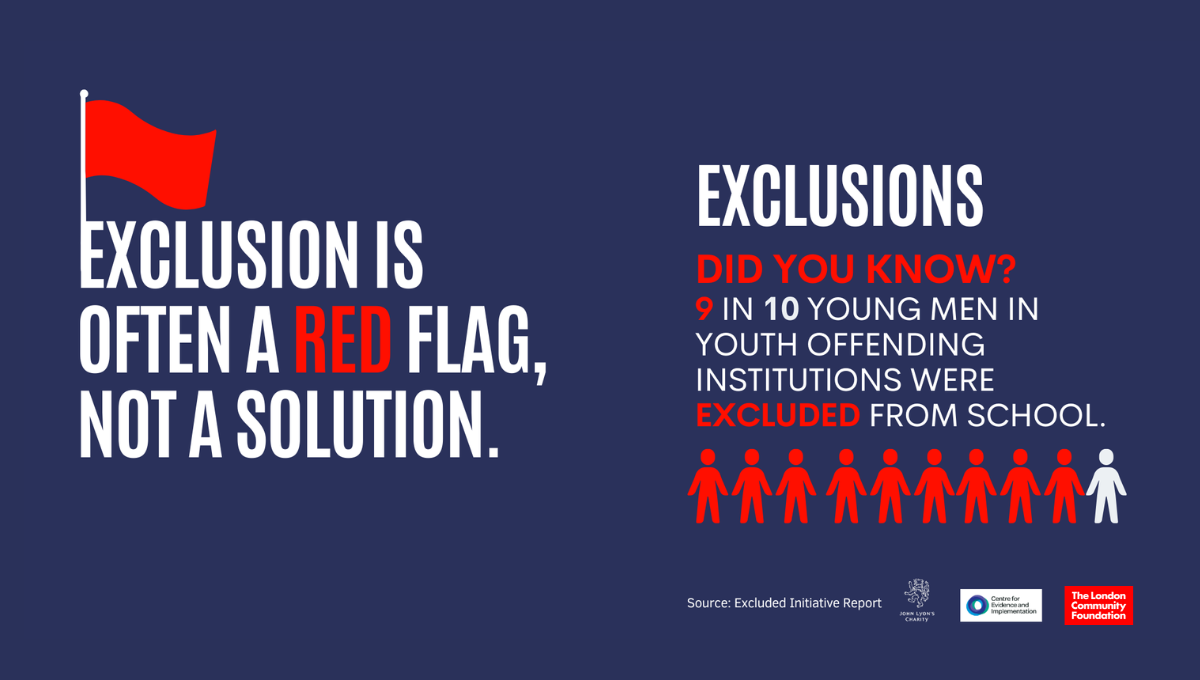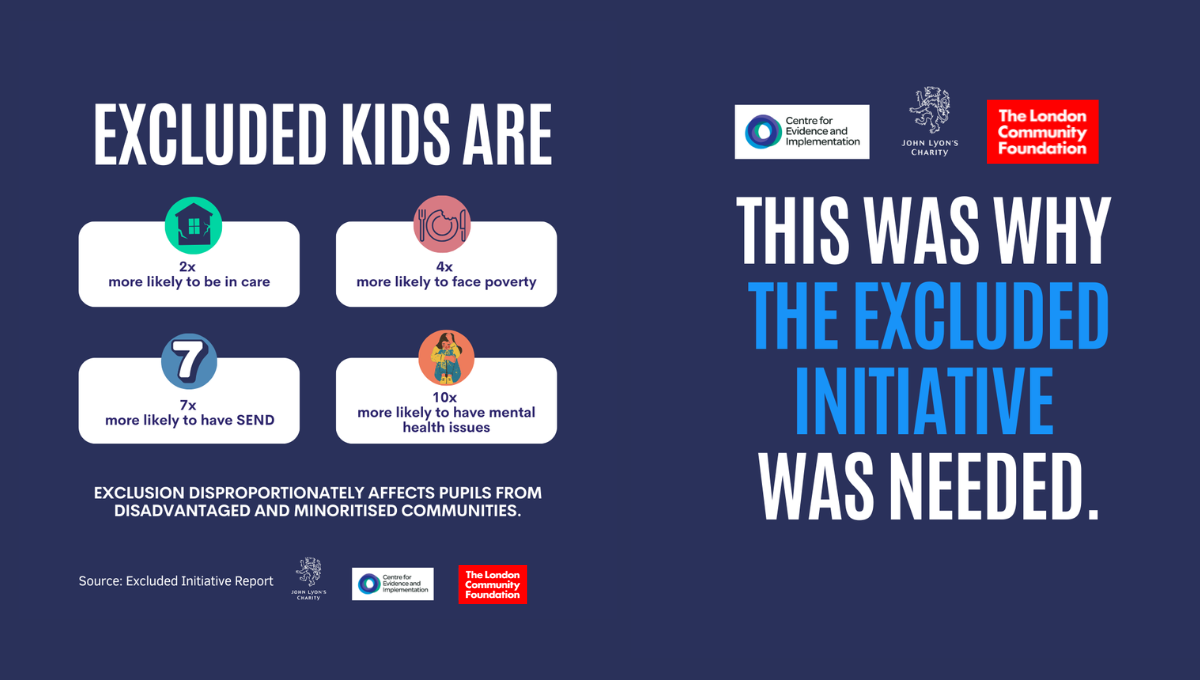
The Excluded Initiative: building inclusion to reduce school exclusions

Launched by the Evening Standard in 2020 in partnership with John Lyon’s Charity and The London Community Foundation, The Excluded Initiative was a campaign to reduce school exclusions. Its mission was not simple - to help schools build their own inclusion capacity and tackle the root causes of suspensions and exclusions. Eight schools took part and each was provided with the funding to create and deliver an on-site inclusion hub bespoke to their unique context. The initiative reached over 500 young people, over half of whom were eligible for free school meals and a third had special educational needs or disabilities. While each hub operated differently, schools came together each term to share learnings, challenges, and successes, which has enabled the participating schools and the partners to develop this crucial offering, responding to needs as they arose.

The backdrop of the Covid-19 pandemic made the initiative even more timely, with national exclusion rates rising by 42% between 2021/22 and 2022/23. An independent evaluation, conducted by the Centre of Evidence and Implementation, has shown that, despite this national trend, schools in the Excluded Initiative saw their suspension rates rise at a much slower pace than a matched control group. Notably, these schools started out with significantly higher exclusion rates, but by the end of the initiative, the gap had narrowed, showing a clear positive impact.
A key outcome of the Excluded Initiative was the ripple effect it had, not just for individual pupils, but for teachers and the school community as a whole. Teachers felt that they developed a deeper understanding of their pupils’ needs and, as a result, stronger, more trusting relationships with them. They also reflected on their own learning, adapting their teaching approaches to build more inclusive classrooms. Across the wider school environment, the Initiative helped to cement inclusion as a core school value. It encouraged a move away from the idea of ‘fixing’ children’s behaviour, towards recognising those behaviours as identifiers of need.
For students, it is not only about avoiding suspension and exclusion. It is also about being more integrated into the school community, having the opportunity to enjoy and benefit from learning, and, fundamentally, being healthier, safer and happier. Centre for Evidence and Implementation

The initiative has led to six key practice recommendations, offering a blueprint for other schools looking to create inclusive, supportive environments for all their students.
- Keep links to mainstream education: Pupils in alternative provision should attend mainstream lessons whenever possible, encouraging continued engagement with their learning and keeping them part of the school community.
- Plan for reintegration: A structured return to mainstream education is key to a pupil's future trajectory. This includes relationship-building with teachers, phased transitions, flexible behaviour policies, and the involvement of specialist staff.
- Consider parents/carers as partners: Schools should actively involve parents and carers in all aspects of provision, including referral and reintegration, keeping them informed and engaged to reinforce impact beyond the intervention setting.
- Embed the inclusion of Senior Leadership Teams: Headteachers and senior staff should have a key role in provision, including line-management of intervention staff, participating in referrals and reintegration processes, and setting clear expectations for mainstream teachers.
- Engage mainstream teachers: Giving teachers the capacity and responsibility to teach in intervention settings keep pupils on track with their learning and provides valuable opportunities for teachers to develop more inclusive teaching practices.
- Build a whole-school ethos: A wider whole school approach to inclusion is essential. Training on topics such as attachment, trauma, and safeguarding helps all staff create a culture where every pupil feels supported.
The full evaluation and executive summary can be viewed here.
John Lyon's Charity
Since its launch in 2020, The Excluded Initiative has been a linch-pin of John Lyon’s Charity’s approach to tackling school exclusions. By working closely with the participating schools, the Charity has had a valuable, ongoing insight into the ongoing challenges schools are facing, and has been able to embed these key lessons and emerging trends across its wider grants portfolio.
For the Charity, one of the clearest themes to emerge from the initiative is the growing number of children with special educational needs and disabilities in mainstream schools and how this is influencing exclusion rates because, too often, schools are unable to provide the level of support these pupils require, leading to disruption, exclusion and, ultimately, the loss of learning. Additionally, while the pandemic undeniably contributed to a national rise in exclusions, what’s even more concerning is its effect on children’s mental health. With emotional wellbeing challenges now surfacing earlier, exclusions are increasingly affecting younger age groups, a trend reflected in feedback from organisations supported by the Charity to provided vital emotional wellbeing services in school.
A common thread across the Initiative has been the critical importance of supporting children through the transition from primary to secondary education. This period is more than just a change in curriculum, it is a shift in environment, expectations, and social expectations. For many pupils, especially those with additional needs, it can be overwhelming and can spark 'unwanted' behaviour that risks exclusion.
In response to this changing landscape, the Charity is building a bold new focus - The Transitions Initiative. Building on everything learned so far, this new phase will prioritise prevention and early intervention, with a strong focus on the primary-to-secondary transition period. Through its Schools in Partnership Fund, the Charity will provide targeted funding to secondary schools, embedding lessons from the Excluded initiative evaluation, to partner with their feeder primary schools, ensuring a joined-up, early intervention, approach to supporting pupils at risk of exclusion.
By targeting early intervention and enabling schools to trial innovative solutions, John Lyon’s Charity hopes to encourage a lasting culture change in schools, and by working with both primary and secondary schools, the aim is to build a more inclusive education system, one that prevents exclusion before it begins.
The London Community Foundation
At The London Community Foundation we pride ourselves on being responsive to the changing needs of communities in London. We know communities can identify their own responses to the challenges they face, but often lack the resources. Our task is to support them. We do that by championing local organisations, connecting funders to them, channelling funds to their work, and supporting them directly to be stronger.
The Excluded Initiative represents a great example of this collaboration – working in partnership with John Lyon’s Charity and the Evening Standard Dispossessed Fund, bringing together schools under similar objectives to share and learn from one another, and working closely with the Centre for Evidence and Implementation to understand and demonstrate the impact that this kind of initiative can have.
Tackling high levels of exclusion ensures that children are not left behind and put at greater risk from the root causes. Throughout our programmes with young people, we see how critical it is to work with them early, to provide a supportive and inclusive environment and help them build relationships and skills that will serve them in the long term. The opportunity for a good education and a stronger start in adult life can have significant ripple effects in the wider community.
Another benefit of the Excluded Initiative has been working with the schools that have developed the solutions themselves. Inviting individual schools to shape their ideas and solutions based on their own individual needs and circumstances ensures a truly responsive outcome in each setting. When learnings are shared and evaluation is actively prioritised, the longer-term impact can be far wider and more significant. As the report’s recommendations show, The Excluded Initiative has revealed that there can be a way to affect real change in schools in terms of inclusion and reintegration and The London Community Foundation is proud to have played a part in this initiative.

